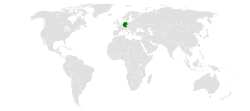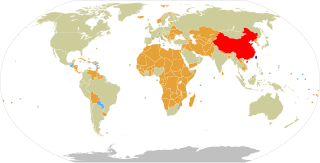
The Republic of China (ROC), commonly known as Taiwan, currently has formal diplomatic relations with 12 of the 193 United Nations member states and with the Holy See, which governs Vatican City, as of 2 April 2023. In addition to these relations, the ROC also maintains unofficial relations with 59 UN member states, one self-declared state (Somaliland), three territories (Guam, Hong Kong, and Macau), and the European Union via its representative offices and consulates under the One China principle. The Government of the Republic of China has the 31st largest diplomatic network in the world with 110 offices.
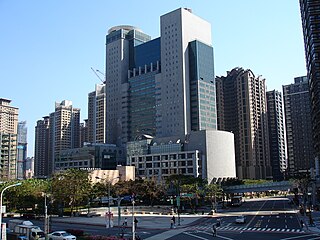
New Taipei City is a special municipality located in northern Taiwan. The city is home to an estimated population of 4,004,367 as of January 2023, making it the most populous city of Taiwan, and also the second largest special municipality by area, behind Kaohsiung. New Taipei City neighbours Keelung to the northeast, Yilan County to the southeast, and Taoyuan to the southwest, and completely encloses the city of Taipei. Banqiao District is its municipal seat and biggest commercial area.

The Taipei Economic and Cultural Representative Office (TECRO), also known as Taipei Economic and Cultural Office (TECO), Taipei Representative Office (TRO) or Taipei Mission, is an alternative diplomatic institution serving as a de facto embassy or a consulate of the Republic of China to exercise the foreign affairs and consular services in specific countries which have established formal diplomatic relations with the People's Republic of China. As the PRC denies the legitimacy of the ROC as a sovereign state and claims the ROC-controlled territories as an integral part of its China. An exclusive mandate namely One-China policy, mandates any country that wishes to establish a diplomatic relationship with the PRC must first sever any formal relationship with the ROC. According to The Fletcher Forum of World Affairs, "non-recognition of the Taiwanese government is a prerequisite for conducting formal diplomatic relations with the PRC—in effect forcing other governments to choose between Beijing and Taipei." As a result, these countries only allow the ROC to establish representative offices instead of a fully-fledged embassy or consulate for the purpose of conducting practical bilateral relations without granting full diplomatic recognition.

Hobe Fort or Huwei Fort is a historical fort located near Fort Santo Domingo, in Tamsui District, New Taipei, Taiwan, Republic of China.

The Republic of China government recognized the formation of the Provisional Government of the Republic of Korea on April 13, 1919, as one of the participants of the Cairo Conference, which resulted in the Cairo Declaration. One of the main purposes of the Cairo Declaration was to create an independent Korea, free from Japanese colonial rule. Bilateral diplomatic relations between the Government of the Republic of Korea and the Republic of China began in 1948, just after the foundation of the First Republic, hence making China, the first country to recognize the Republic of Korea as the sole legitimate government of Korea. After the Chinese Civil War in 1949, the Republic of Korea maintained relations with the Republic of China (Taiwan), which the island of Taiwan was also formerly under Japanese rule.

The bilateral relationship between Taiwan and the United States of America are the subject of the Japan-U.S. relations during Japanese colonial rule and China-U.S.relations before the government of the Republic of China (ROC) led by the Kuomintang retreated to Taiwan and its neighboring islands as a result of the Chinese Civil War and until the U.S. ceased recognizing the ROC in 1979 as "China" as a result of the One China policy following the Joint Communiqué on the Establishment of Diplomatic Relations under the Carter administration. Prior to relations with the ROC, the United States had diplomatic relations with the Qing dynasty beginning on June 16, 1844 until 1912.
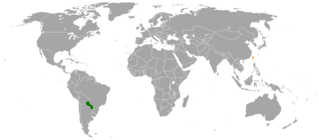
Paraguay–Taiwan relations, also known as Sino–Paraguayan relations or Paraguayan–Taiwanese relations are foreign relations between the Republic of Paraguay and the Republic of China (Taiwan). Both governments established diplomatic relations on 8 July 1957.

The British Consulate at Takao is a former British consulate built in 1865 in Gushan District, Kaohsiung, Taiwan. It has been designated a historic site by the Ministry of Culture.

Tamsui District is a seaside district in New Taipei, Taiwan. It is named after the Tamsui River; the name means "fresh water". The town is popular as a site for viewing the sun setting into the Taiwan Strait. Though modest in size, it has a large role in Taiwanese culture.

The Embassy of the United States, Taipei is a former United States diplomatic mission in Zhongshan District, Taipei, Taiwan. The building current houses the Taipei Film House as a movie theater.

The Apostolic Nunciature to China is the diplomatic mission of the Holy See to the Republic of China. The Republic of China is now more commonly referred to as “Taiwan”. However, as far as the Vatican is concerned, the Republic of China is the state of “China”. The Holy See does not have a diplomatic mission in, or diplomatic relations with, the People's Republic of China (PRC). The Apostolic Nunciature to China is located at 7–1, Lane 265, Heping East Road Section 2, Daan District, Taipei.
Events from the year 2014 in Taiwan, Republic of China. This year is numbered Minguo 103 according to the official Republic of China calendar.
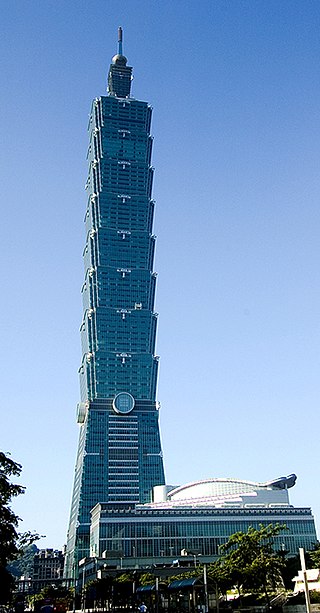
The German Institute Taipei ; is the overseas representative office of Germany in Taiwan, which promotes the non-diplomatic German-Taiwanese relations and looks after German interests there. Tasks of the institution includes the increasing of bilateral cooperation, dealing with consular affairs like Visa or passport, providing a variety of services for German citizens in Taiwan and German-related information to Taiwanese people. In some instances, it maintains contacts with Taiwanese government on behalf of the Federal Republic of Germany, acting as a de facto embassy. Institute affairs are led by a Director General, who acts as the German representative to Taiwan.

Relations between Taiwan and the United Kingdom is the subject of China–United Kingdom relations. Due to the One China policy the United Kingdom does not recognize the Government of the Republic of China and all diplomatic relations between the two countries take place on an unofficial basis. Taiwan maintains the Taipei Representative Office in the U.K. in London with a branch office in Edinburgh while the United Kingdom maintains the British Office Taipei in Taipei.

Haiti–Taiwan relations or ROC–Haitian relations refer to the bilateral relations between the Republic of Haiti and Republic of China (Taiwan). Haiti maintains an embassy in Taipei and Taiwan maintains an embassy in Port-au-Prince.

The relations between Taiwan, and the European Union (EU) are complicated by the fact that, pursuant to the One-China policy, all EU member states recognize the People's Republic of China (PRC) as the sole sovereign state under the name 'China'.
Events from the year 2021 in Taiwan, Republic of China.

The Republic of China (ROC) and Lithuania established diplomatic relations in 1921, three years after Lithuania's declaration of independence in 1918. The relations continued until the Soviet occupation of the Baltic states in 1940. The ROC did not recognise the Soviet annexation of Lithuania. The ROC lost the vast majority of its territory, namely mainland China, to the People's Republic of China (PRC) in 1949, and it has been limited to the island of Taiwan, formerly a Japanese colony and minor associated islands since the 1950s. Democratic Lithuania and modern-day ROC established unofficial diplomatic relations in 2021, thirty-one years after the restoration of Lithuania's independence in 1990.

France–Taiwan relations are bilateral relations between France and Taiwan.
Taiwan-Slovakia relations refers to bilateral ties between Taiwan and Slovakia.
